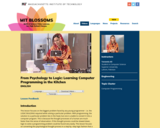
This lesson focuses on the biggest problem faced by any young programmer - i.e. the LOGIC BUILDING required while solving a particular problem. With programming, the solution to a particular problem lies in the head, but one is unable to convert it into a computer program. This is because the thought processes of a human are much faster than the sense of observation. If this thought process could be slowed down, logic to solve a programming problem could be found very easily. This lesson focuses on converting this psychological thought process in a step-by -step logic fashion that a computer program can understand. This lesson is recorded in a kitchen where the basic programming concepts are taught by giving examples from the process of making a mango milk shake. This lesson teaches the 4 following techniques: 1) Swapping two variables by swapping a glass of milk with a glass of crushed ice; 2) Finding max from an array by finding the biggest mango; 3) Sorting an array by arranging the jars; and 4) Understanding the concept of a function, parameters and return type by comparing it with the blender/juicer. The lesson targets those students who know the syntax of programming in any language (C or GWBASIC preferred), but are unable to build the logic for a program. It can be taught in a class of 45 to 50 minutes.
This lesson is also available in Mandarin Chinese.
- Subject:
- Engineering
- Psychology
- Science
- Social Science
- Material Type:
- Lecture
- Provider:
- M.I.T.
- Provider Set:
- MIT Blossoms
- Author:
- Tanzeela Ali
- Date Added:
- 12/10/2020